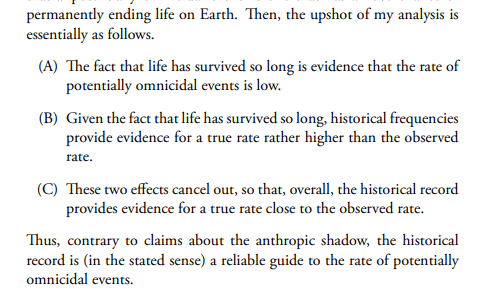This is a linkpost for Dispelling the Anthropic Shadow by Teruji Thomas.
Abstract:
There are some possible events that we could not possibly discover in our past. We could not discover an omnicidal catastrophe, an event so destructive that it permanently wiped out life on Earth. Had such a catastrophe occurred, we wouldn’t be here to find out. This space of unobservable histories has been called the anthropic shadow. Several authors claim that the anthropic shadow leads to an ‘observation selection bias’, analogous to survivorship bias, when we use the historical record to estimate catastrophic risks. I argue against this claim.
Upon a first read, I found this paper pretty persuasive; I'm at >80% that I'll later agree with it entirely, i.e. I'd agree that "the anthropic shadow effect" is not a real thing and earlier arguments in favor of it being a real thing were fatally flawed. This was a significant update for me on the issue.
Anthropic shadow effects are one of the topics discussed loosely in social settings among EAs (and in general open-minded nerdy people), often in a way that assumes the validity of the concept[1]. To the extent that the concept turns out to be completely not a thing — and for conceptual rather than empirical reasons — I'd find that an interesting sociological/cultural fact.


Habryka referred me to https://forum.effectivealtruism.org/posts/A47EWTS6oBKLqxBpw/against-anthropic-shadow , whose "Possible Solution 2" is what I was thinking of. It looks like anthropic shadow holds if you think there are many planets (which seems true) and you are willing to accept weird things about reference classes (which seems like the price of admissions to anthropics). I appreciate the paper you linked for helping me distinguish between the claim that anthropic shadow is transparently true without weird assumptions, vs. the weaker claim in Possible Solution 2 that it might be true with about as much weirdness as all the other anthropic paradoxes.